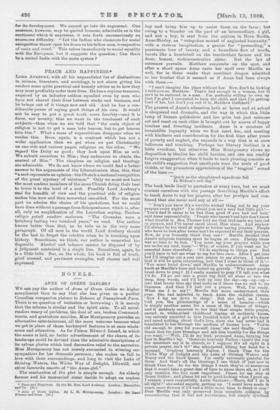PEACE AND HAPPINESS.*
LORD AVEBUBY, with all his unparalleled list of distinctions in science, literature, and sociology, is not above giving his readers some quite practical and homely advice as to how they may most profitably order their lives. Helms a copious treasure, acquired by an industry seldom equalled even by men who have not shared their lives between study and business, and
he brings out of it things new and old. And he has a con- ). inderable power of saying good things of his own. It would
not be easy to put a great truth more forcibly—and it is force, not novelty, that we want in the treatment of such subjects—than when we are told that "the main object of religion is not to get a man into heaven, but to get heaven into him." What a mass of superstitions disappear when we realise this. Here, again, is a contrast which has not a wider application than we get when we put Christianity on one aide and various pagan religions on the other. "We regard the Deity as good ; they look upon Him as evil. We submit ourselves to Him ; they endeavour to obtain the control of Him." The chapters on religion and theology are admirable. We do not know where we could find a better answer to the arguments of the Liberationists than this, that ma sect represents an opinion: the Church a national recognition of the great mystery of existence." Only we must not have the most zealdus members of the same Church doing their best to lower it to the level of a sect. Possibly Lord Avebury's seal for breadth of view and the practical side of religion makes him now and then somewhat one-sided. For the most part we admire the choice of his quotations, but we could have done without a pasaage from Sohopenhauer, which is, after all, only an amplification of the Lucretian saying, Tantum, relligio potuit suadere malarum. "The Crusades were a butchery lasting two hundred years," we read. Our author knows better than that, as be tells us in the very same paragraph. Of all men in the world, Lord Avebury should be the last to forget the relative when he is touching upon history. Sometimes, we think, our author is somewhat too dogmatic. Alcohol and tobacco cannot be disposed of by a judgment contained in a single line. Sometimes, again, be Is a little trite. But, on the whole, his book is full of truth, 'good counsel, and pertinent examples, well chosen and well expressed.






































 Previous page
Previous page